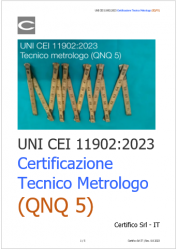ISO/TS 7240-29:2017: Video Fire Detectors (VFD)
| ID 4339 | | Visite: 6630 | News generali | Permalink: https://www.certifico.com/id/4339 |

ISO/TS 7240-29:2017 - Fire detection and alarm systems - Part 29: Video fire detectors
13 July 2017
New ISO standard on video fire detectors will help save lives
Early detection of fire and smoke are essential to save lives, property and the environment. Modern technology such as video fire detectors, especially in some high-risk places like tunnels, oil and gas environments, public buildings or storage areas, enable a fast response to a potential fire. A new ISO technical specification on video fire detectors helps ensure more efficient and reliable equipment.
According to the Center of Fire Statistics (CFS) of the International Association of Fire and Rescue Services (CTIF), among 31 countries representing 14 % of the world’s population, fire services reported 3.5 million fires, 18.5 thousand civilian fire deaths and 45.0 thousand civilian fire injuries in 2015.
Video detection technology detects, identifies and analyses smoke at the first sign of fire or flame. The equipment’s understanding of the behaviour and movement of smoke enables users, located on site or remotely, to raise the alert and take appropriate action early.
Keith Shinn, Chair of ISO subcommittee ISO/TC 21/SC 3 that developed the standard, says: “In large open compartments, it can remove the delay in smoke travelling to the detector and result in a quicker response by emergency services. It can also permit smoke detection in harsh environments where it may otherwise be impractical.”
ISO/TS 7240-29:2017, Fire detection and alarm systems – Part 29: Video fire detectors, specifies requirements, test methods and performance criteria for video fire detectors (VFD) operating in the visible spectrum, for use in fire detection and alarm systems installed in and around buildings.
Isaac Papier, Convenor of ISO subcommittee ISO/TC 21/SC 3, explains: “Industrial fire detection serves two vital functions. First in preventing loss of the facility, but actually, more importantly, in providing a fast response such that operation is not interrupted resulting in severe revenue loss. Today’s modern automated production facilities comprise of huge investments with revenue flows often exceeding millions of dollars per hour. Any downtime can very quickly amount to huge sums. Further, any shutdown can involve complex and lengthy start-up procedures that further exacerbate the loss. A video fire detector is an excellent tool to effectively monitor a large area in real time.”
Until now, there has been no comprehensive international specification for video fire detectors and ISO/TS 7240-29 provides the first platform for international acceptance of a uniform specification.
Shinn explains: “The community at large should be the greatest beneficiary of the release of this technical specification. It now has the opportunity for enhanced protection of life safety at reduced cost. The closed-circuit television sector (CCTV) is the fastest-growing segment of the security industry and the synergy with life safety cannot be ignored.”
Papier adds: “Considering that many of the facilities where VFDs are to be installed are owned by international conglomerates, an internationally accepted specification is ideal.” He believes the publication of this technical specification should significantly expand the VFD market. “Often, in a large industrial facility, VFDs are the only viable solution. Unfortunately, without the existence of a published International Standard, owners and insurance carriers were hesitant to rely on this solution without a comprehensive International Standard.”
With the new technical specification, facilities owners and their insurance carriers, as well as manufacturers, stand to benefit directly. Papier again: “The new ISO/TS 7240-29 provides owners and insurance carriers with the international consensus metrics for performance of VFDs. The manufacturers will benefit because the existence of the technical specification gives users and specifiers the confidence to include VFDs in their fire protection schemes, creating a market for these products. For manufacturers, the technical specification provides a design specification for building the products.”
A fire detection and alarm system is required to function satisfactorily, not only in the event of a fire, but also during and after exposure to conditions likely to be met in practice, including corrosion, vibration, direct impact, indirect shock and electromagnetic interference. Tests are intended to assess the performance of the video fire detectors under such conditions.
According to Shinn, this technical specification will allow the industry to move forward in an organized way. The ISO subcommittee recognized that a number of questions will still need to be answered and this would be best achieved by gaining practical experience from the industry using the specification, which it is hoped will be converted to a standard in future years.
ISO/TS 7240-29:2017 was prepared by technical committee ISO/TC 21, Equipment for fire protection and fire fighting, subcommittee SC 3, Fire detection and alarm systems, whose secretariat is held by SA, the ISO member for Australia. It is now available from your national ISO member or through the ISO Store.
Fonte: ISO
Tags: Normazione Norme ISO




















